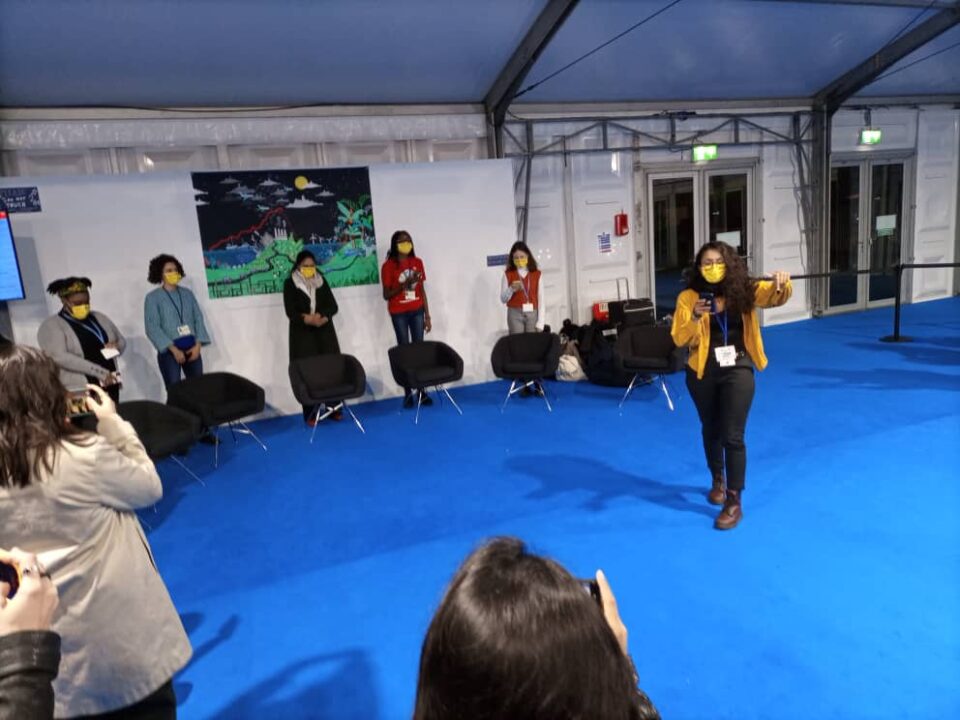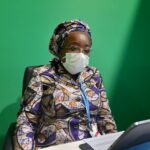By Chuks Oyema-Aziken
The Centre for 21st century Issues (C21st), has called for the inclusion of more women organisations in the heart of climate response decision-making process for more effective and goal-oriented climate actions.
The call is contained in a press statement issued by the organisation at the UN Climate Change Conference (COP26) holding in Glasgow, Scotland.
The statement titled ‘Our Advocacy Statement for COP26’ was signed by the Executive Director, Ms Titi Akosa.
C21st said it is critical to re-emphasise the place of climate financing which is aimed at tackling climate change and protecting the poorest and most vulnerable communities from its impacts.
“Climate change is one of the greatest challenges facing humanity today. The negative effects of climate change on welfare, livelihoods and economic prospects are felt by all people from all countries; but more by developing countries. The most vulnerable populations in developing countries suffer the greatest impacts of climate change. This is true for women and girls; especially in Africa.
“The barriers women face in accessing climate funds are evident. Therefore, addressing, reducing and overcoming these barriers are essential through climate finance with the view to fulfilling the mission of tackling climate crisis. It is imperative for climate women advocates from all across Africa to push for gender climate action and active participation of African women for effective gender responsive climate finance.
The organization said that many challenges faced by women amid COVID-19 induced situations call for leaders to prioritise women’s needs.
“Some development reports including the UNICEF report pointed out that children in Africa are at ‘extremely high risk’ of the impacts of climate crisis, but emphasized that children’s vulnerabilities to climate change is inexorably tied to the burden of women who take care of the children and bear the greatest impact of climate change.
“Women farmers who constitute 70 to 80 percent of the labour force in the agricultural sector in Africa are at the mercy of climate change, with a resultant effect on food security.
The statement said it is the responsibility of world leaders to ensure there is access to climate finance for local women especially for Agro-ecology in addressing the huge impact of climate change on livelihoods.
“A major step to financing climate change action is to prioritize empowerment of women.
“According to a report published by the Intergovernmental Panel on Climate Change (IPCC), Climate Change is a “code red for humanity” due to increasing temperatures, rising sea levels, unpredictable rainfall and flooding which adversely affect millions of people.
“Climate change is triggered by greenhouse gas emissions from fossil fuel, bush burning and deforestation which imperil the planet and put billions of people at immediate risks of negative impacts on livelihoods and health.
“As a continent highly vulnerable to climate change, adaptation is a priority for Africa. It is therefore imperative to state that more funds should be channeled to addressing adaptation and mitigation at the local level in order to build resilience to climate change.
“Although the Green Climate Fund (GCF) and several others funding opportunities have been very strategic in building capacities and project implementation in several ways, access to these funds has however been very challenging for many African countries.
“While these funds provide substantial grant financing for both adaptation and mitigation projects, Africa is not getting its fair share. More climate funds should therefore be devoted to Africa. Just as COVID-19 pandemic was given a top priority, climate action must also be considered a top priority. We need a fast-tracked finance to address the resultant twin pandemic because COVID-19 has aggravated the impacts of Climate Change.
“Over the years, developed countries, whose carbon actions are responsible for the current climate crisis, have repeatedly pledged about $100 billion per year to help developing countries mitigate climate change.
At COP15 in Copenhagen in 2009, developed countries pledged to mobilise $100-billion a year by 2020 to support vulnerable developing countries in tackling climate change and its impacts. This commitment was reaffirmed at COP21 in Paris in 2015. However, these pledges are far from being met.
“African Continent has been badly hit by COVID-19 pandemic with economies of many countries struggling for recovery. This places a huge additional burden on African treasuries which are already overstretched and grossly depleted.
“Notwithstanding, there are barriers African countries must overcome in accessing climate finance necessary to address adaptation measures.
“To this end, Centre for 21st Century (C21st) will be demanding that COP26 delivers on the promise of developed countries to help African countries address the challenges of climate change. We believe that sizeable proportion of available climate funds should be channeled towards climate change adaptation in Africa.
“As an organisation, C21st is recommending that more women organisations should be at the heart of the climate response decision-making process for more effective and goal-oriented climate actions. C21st will continue to amplify African women’s voices in Climate Finance which must be heard loud and clear.
“C21st will be joining other women from across the globe; particularly stakeholders from women and gender constituencies to canvass and mobilise support around other key demands at COP 26.
Centre for 21st century Issues (C21st) is a not-for-profit/non-governmental organization responding to the challenges of the 21st Century through addressing inequality, climate change, democracy and governance.



